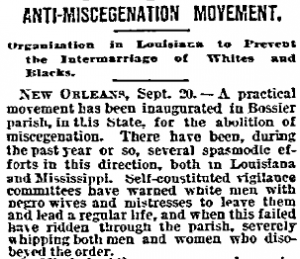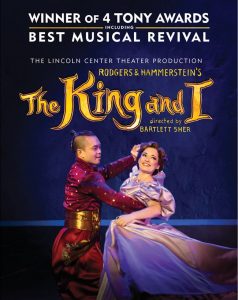Up until 1967 and the Loving vs. Virginia court case, interracial marriages were deemed illegal in the United States. This does not mean that interracial relations did not occur prior to this time. There is in fact a long history of interracial relations in the United States, many of which come along with much trauma, particularly in the history of white, male slave masters raping their black female slaves. That being said, views supporting anti-miscegenation are what allowed for interracial marriages to remain illegal until so recently. As seen in the newspaper article below, anti-miscegenation groups with the soul purpose of preventing interracial marriages were not uncommon. Much of anti-miscegenation is based in the idea of white supremacy and the sentiment that white racial purity must be upheld.
Living in a society rooted in white supremacy has enormous effects on mixed race individuals, particularly in contributing towards feelings of internalized racism. Internalized racism is when an individual feels a sense of low self worth and negative attitudes about their own race as a consequence of being a part of a racist society. This feeling is particularly prominent among mixed race individuals, especially those of both a minority and non-minority racial group. Combining this with the history of anti-miscegenation beliefs and laws contributes to a prevalence of internalized racism within mixed race individuals.
There are a variety of Broadway shows that highlight relationships between a white individual and a person of color. These shows include, but are not limited to, Miss Saigon, The King and I, Hairspray, and South Pacific. Interracial relationships within these musicals are consistently portrayed as “unconventional.” Additionally, the white individual is usually portrayed in an idealized manner whereas the person of color is portrayed as the “other”. In both Miss Saigon and The King and I, the interracial relationships occur because the white individual travels to either Vietnam or Siam. What is not acknowledged, however, is that this global connectedness occurs because of colonial/imperialist history. In Miss Saigon, Chris goes to Vietnam because of the U.S involvement in the Vietnam war. In The King and I, Anna goes to Siam to give the King’s children a European education, something that would not be necessary if it were not for the history of colonialism. Thus from the beginning of the relationships, there is a power dynamic created. There is a sense of superiority established of the white person in the relationship merely because of their white identity. It is possible that mixed race people relate to these relationships because they parents of differing races. These relationship portrayals would likely have a negative effect upon these individuals’ psyches, particularly if one of their parents is white. This is because it emphasizes the superiority of the white parent, which has a strong likelihood of contributing to feelings of internalized racism against their non-white race. The fact that these issues are augmented even in Broadway musicals shows how normal it is for mixed race individuals to be bombarded with reminders of white superiority, making internalized racism seem almost inescapable.
Sources:
“Anti-Miscegenation Movement. Organization in Louisiana to Prevent the Intermarriage of Whites and Blacks.” San Francisco Bulletin (San Francisco, CA), September 30, 1886.
“Loving vs. Virginia: A Documentary Novel of the Landmark Civil Rights Case.” Publishers Weekly 263, no. 46 (2016): 57.
Matthew Murphy, Alistair Brammer and Eva Noblezada, print, 2017. http://www.playbill.com/article/enter-for-your-chance-to-see-miss-saigons-last-performance-on-broadway.
McDowell, T., Ingoglia, L., Serizawa, T., Holland, C. (2005). Raising Multiracial Awareness in Family Therapy Through Critical Conversations. Journal of Marital and Family Therapy, 31(4), 399-411.
The King and I, print, 2017. http://www.broadwaysd.com/upcoming-events/rodgers-hammerstein-king-and-i/.



